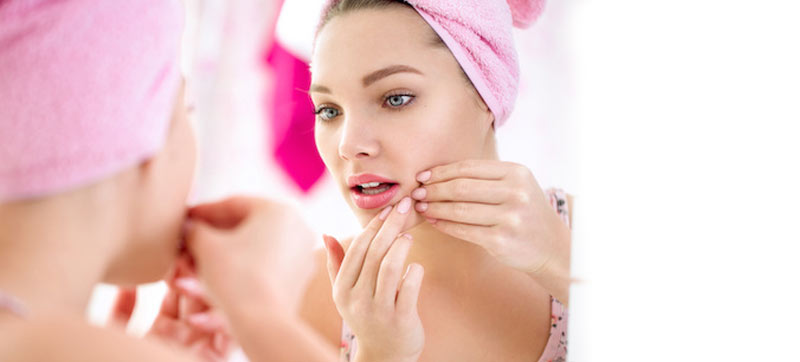Acne occurring or persisting beyond 25 years of age is called adult acne. It is more commonly seen in women.
How does it differ from teenage acne?
Adult acne tends to be present around the mouth and jawline. It can even involve the neck. The acne is usually is seated deeper, and lasts longer than the typical pustule of teenage acne lasting upto 2 or 3 weeks. Sometimes the red spot never goes away. There may also be a premenstrual increase in the acne.
Why do we get acne in 30’s and 40’s?
Hormonal factors, increased use of cosmetics, increased stress levels, poor diet choices, lack of exercise, changes in sleeping and eating patterns, travel and exposure to hot and humid conditions while cooking can all cause adult acne.
Why is acne recurrent?
If the factors mentioned above are not tackled acne may be recurrent even when on treatment. Therefore lifestyle changes become an integral part of acne treatment, without which even the strongest antiacne medicines do not work.
What is the role of diet in acne?
Dairy products and high sugar foods are known to increase hormones which can directly aggravate acne. Thus avoiding milk, cheese, paneer, pizzas, chocolates, milkshakes, fried food in addition to taking acne medication will help to control acne.
How does lifestyle change help in acne?
Chronic stress may cause increased secretion of male hormones in women thus leading to acne. Smoking has been linked to causing acne. A sedentary lifestyle has also been implicated in acne.Thus, exercising for about 45 mins every day brings down the stress levels and the amount of secretion of male hormones, thereby helping reduce acne. Quitting smoking also helps significantly.
Do home remedies help in acne?
Putting things like lemon, garlic and tomato or toothpaste may dry out the acne but it may also burn the skin as all these contain acids/alkalies. Secondly, it doesn’t prevent new acne lesions and it may also dry out the skin excessively so it is not a good idea to apply such products on the face.
Is it recommended to put toothpaste on acne?
Tooth paste may also cause burns on the skin which may heal with pigmentation, so it’s best avoided. The pigmentation caused due to this will take significantly longer to heal.
Do facials and clean-ups help to clear acne?
Facials involve massaging of creams into the face. These creams may be comedolytic which means they can cause or aggravate pre-existing acne. In fact there is a specific entity called acne venenata. Cleanups include removal of blackheads and whiteheads. Sometimes removing it pushes the sebum and inflammatory substance deeper into the skin giving rise to larger acne lesions , increasing the chances of scarring.
How to treat acne?
Mild acne is best treated with anti-acne creams (antiobiotics, vitamin A like creams), facewashes and mild oral antibiotics. If the acne is severe (larger lesions, acne leaving marks and scars) it may require stronger medications like Isotretinoin. Chemical peels also help to reduce acne and marks faster, giving a boost to treatment.
What is isotretinoin?
Isotretinoin is a vitamin A like medicine used is severe acne. It is usually given as a 4-6 month course at the end of which recurrence of acne is extremely unlikely. Isotretinoin is contraindicated in certain conditions but your doctor will rule those out before prescribing it to you.
What is the most common side effect of Isotretinoin?
Dryness of lips and skin is the most common side effect which can easily be controlled with lip balms and moisturizers.
Will isotretinoin affect my ability to conceive?
No, it does not interfere with conception.
Will isotretinoin cause problems in future pregnancies?
Just like X-rays and certain antibiotics are not advised during pregnancy, isotretinoin is avoided during pregnancy. It is safe to conceive as early as 3 months after stopping the medicine.
Why are oral contraceptive pills (OCP’s) prescribed for acne?
OCP’s help regulate the hormones causing acne in women. The result is usually evident after taking it for a minimum of three cycles. Another reason for the doctor prescribing you Isotretinoin may be as an additional contraceptive so that you don’t get pregnant while on isotretinoin.
How long does it take for acne to get better?
Acne takes a minimum of 4-6 weeks to get better even with treatment. It may take longer if there is no complementary lifestyle.
How do chemical peels help in acne?
Chemical peels basically work as exfoliating agents and help in drying out the acne. They also help to clear out marks. Chemical peels work best when done as a series of at least 4-6 peels. You may not see the desired effect after a single peel.
How can acne scars be treated and how long does the treatment last?
Acne scars respond only to invasive procedures like subcision, dermaroller, CO2 lasers, RFM micro Needling, tixel etc. Since scars are depressions on the skin, topical or internal medications don’t help in treating them.Acne scar treatment is usually done in sessions that are about a month apart.A minimum of 4-6 sessions is required to see a 50% improvement which is considered the end point of treatment. your doctor may do one or may combine multiple techniques depending on the kind of scars you have.
What is the significance of hair loss and increased facial hair in acne?
These conditions point to a definite hormonal imbalance and may be associated with PCOS.
What is PCOS and how is it related to acne?
Polycystic ovarian syndrome (PCOS) is a condition increasingly being diagnosed in girls and women and occurs due to a hormonal imbalance. It commonly presents with irregular periods, increased facial hair growth, infertility, and obesity. Acne and thin hair on the frontal scalp are skin manifestations of PCOS.
Didn't find what you were looking for? Ask Dr Dixit your question and get answers within a day.
The information provided in Dr. Dixit's answer is for educational purposes only and is not intended to constitute medical advice. The information provided should not be relied upon as a substitute for consultations with a qualified health professional who may be familiar with your individual medical needs.

 09901890588
09901890588





